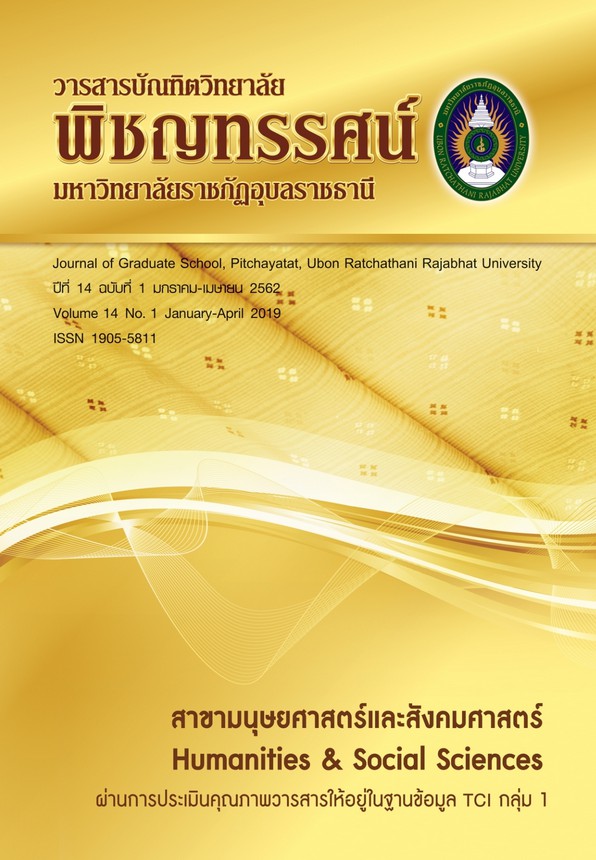ผลการจัดกิจกรรมประกอบอาหารที่มีต่อความคิดสร้างสรรค์ของเด็กปฐมวัย
คำสำคัญ:
กิจกรรมประกอบอาหาร, ความคิดสร้างสรรค์, เด็กปฐมวัยบทคัดย่อ
การวิจัยเรื่องผลการจัดกิจกรรมประกอบอาหารที่มีต่อความคิดสร้างสรรค์ของเด็กปฐมวัย มีวัตถุประสงค์เพื่อเปรียบเทียบความคิดสร้างสรรค์ของเด็กปฐมวัย ก่อนและหลังการจัดกิจกรรมประกอบอาหาร กลุ่มเป้าหมายที่ใช้ในการวิจัยครั้งนี้เป็นเด็กชาย-หญิง จำนวน 26 คน อายุระหว่าง 5-6 ปี กำลังเรียนอยู่ชั้นอนุบาล 2 ภาคเรียนที่ 2 ปีการศึกษา 2560 โรงเรียนวัดรัชฎาธิฐาน เขตตลิ่งชัน สังกัดกรุงเทพมหานคร เครื่องมือที่ใช้ในการวิจัย ประกอบด้วย แผนการจัดกิจกรรมประกอบอาหารจำนวน 24 แผน แบบประเมินความคิดสร้างสรรค์ที่ผู้วิจัยสร้างขึ้น และแบบสังเกตพฤติกรรม วิเคราะห์ข้อมูลโดยการหาค่าเฉลี่ย ค่าเบี่ยงเบนมาตรฐาน และวิเคราะห์ข้อมูลเชิงคุณภาพโดยการวิเคราะห์เชิงเนื้อหา ผลการวิจัยพบว่า เด็กปฐมวัยที่ได้รับการจัดกิจกรรมประกอบอาหาร มีคะแนนความคิดสร้างสรรค์หลังการทดลองสูงกว่าก่อนการทดลอง และผลจากการสังเกตพฤติกรรมพบว่าเด็กปฐมวัยที่ได้รับการจัดกิจกรรมประกอบอาหาร มีความคิดสร้างสรรค์สูงขึ้น โดยพบว่าเด็กมีความคิดริเริ่มจากการออกแบบรูปร่าง ลักษณะของอาหาร มีความคิดคล่องแคล่วจากการตอบคำถามและบอกชื่อวัตถุดิบที่ใช้ในการประกอบอาหารได้อย่างรวดเร็ว มีความคิดละเอียดลออจากการบอกรายละเอียดของอาหาร บอกขั้นตอนการประกอบอาหาร และตกแต่งอาหารได้อย่างชัดเจน สมบูรณ์ มีความคิดยืดหยุ่นจากการปรับเปลี่ยนความคิดในการเลือกใช้วัตถุดิบและประกอบอาหารได้อย่างหลากหลายรูปแบบ
เอกสารอ้างอิง
คณะกรรมการการประถมศึกษาแห่งชาติ, สำนักงาน. แผนการจัดประสบการณ์ชั้นอนุบาลปีที่ 1 เล่ม 1 สำนักงานคณะกรรมการการศึกษา. กรุงเทพฯ: โรงพิมพ์คุรุสภาลาดพร้าว, 2541.
............ พัฒนาการของคุณภาพนักเรียนประถมศึกษาและแนวทางการประเมิน. กรุงเทพฯ: โรงพิมพ์การศาสนา, 2544.
คณะกรรมการข้าราชการพลเรือน, สำนักงาน. หนังสืออิเล็กทรอนิกส์ การคิดเชิงสร้างสรรค์. (ออนไลน์) 2559 (อ้างเมื่อ 6 มกราคม 2561). จาก http://www.ocsc.go.th/.
คณะกรรมการพัฒนาการเศรษฐกิจและสังคมแห่งชาติ, สำนักนายกรัฐมนตรี. แผนพัฒนาเศรษฐกิจและสังคมแห่งชาติฉบับที่สิบสอง พ.ศ. 2560– 2564. (ออนไลน์) 2559 (อ้างเมเมื่อ 6 มกราคม 2561). จาก http://www.nesdb.go.th/ewt_dl_link.php?nid=6422.
จีระพันธุ์ พูลพัฒน์. บทความทางการศึกษา. กรุงเทพฯ: พัฒนาคุณภาพวิชาการ, 2559.
ชลธิชา ชิวปรีชา. ความคิดสร้างสรรค์ของเด็กปฐมวัยที่ทำกิจกรรมศิลปะด้วยใบตอง. ปริญญาการศึกษามหาบัณฑิต มหาวิทยาลัยศรีนครินทรวิโรฒ, 2554.
นภเนตร ธรรมบวร. หลักสูตรเพื่อพัฒนาเด็กปฐมวัยในประมวลสาระชุดวิชา การจัดประสบการณ์สำหรับเด็กปฐมวัย หน่อวที่ 3. นนทบุรี: มหาวิทยาลัยสุโขทัยธรรมมาธิราช, 2549.
ปฤณัต นัจนฤตย์. การพัฒนาหลักสูตรการออกแบบตกแต่งอาหารเชิงเศรษฐกิจสร้างสรรค์สำหรับบุคลากรธุรกิจ. ปริญญาปรัชญาดุษฎีบัณฑิต มหาวิทยาลัยศิลปากร, 2553.
ผดุง พรมมูล. พัฒนาการเรียนรู้เด็กปฐมวัยด้วยกิจกรรมอาหาร ศิลปะ และดนตรี. กรุงเทพฯ: ห้างหุ้นส่วนจำกัด เม็ดทรายพริ้นติ้ง, 2552.
พัชรมณฑ์ ศุภสุข. การพัฒนาความคิดสร้างสรรค์ในเด็กปฐมวัยโดยการเล่านิทานประกอบคำถามปลายเปิดแบบมีโครงสร้างควบคู่การเสริมแรงทางสังคม. ปริญญาการศึกษามหาบัณฑิต มหาวิทยาลัยศรีนครินทรวิโรฒ, 2556.
ไพฑูรย์ สินลารัตน์ และคณะ. เติบโตเต็มตามศักยภาพสู่ศตวรรษที่ 21 ของการศึกษาไทย. กรุงเทพฯ: โรงพิมพ์แห่งจุฬาลงกรณ์มหาวิทยาลัย, 2557.
วาทินี บรรจง. ผลของการจัดประสบการณ์ศิลปะโดยบูรณาการแนวคิดเชิงออกแบบที่มีต่อความคิดสร้างสรรค์ของเด็กอนุบาล. ปริญญาครุศาสตรมหาบัณฑิต จุฬาลงกรณ์มหาวิทยาลัย, 2556.
ศรินยา ทรัพย์วารี. ผลการจัดกิจกรรมประกอบอาหารที่มีต่อทักษะพื้นฐานทางคณิตศาสตร์ของเด็กปฐมวัย. ปริญญาการศึกษามหาบัณฑิต มหาวิทยาลัยศรีนครินทรวิโรฒ, 2552.
ศึกษาธิการ, กระทรวง. หลักสูตรการศึกษาปฐมวัยพุทธศักราช 2546. กรุงเทพฯ: โรงพิมพ์ครุสภา ลาดพร้าว, 2546.
สุชาดา นทีตานนท์. ผลการจัดประสบการณ์แบบปฏิบัติจริงที่มีต่อความคิดสร้างสรรค์ของเด็กปฐมวัย. ปริญญาการศึกษามหาบัณฑิต มหาวิทยาลัยศรีนครินทรวิโรฒ, 2550.
อารี พันธ์มณี. ฝึกให้คิดเป็น คิดให้สร้างสรรค์. พิมพ์ครั้งที่ 3. กรุงเทพฯ: ใยไหม, 2547.
อารี รังสินันท์. ความคิดสร้างสรรค์. พิมพ์ครั้งที่ 3. กรุงเทพฯ: ข้าวฟ่าง, 2549.
Dahl, K. Why Cooking in the Curriculum?. Young Children 53,1 (1998): 81-83.
Guilford, J.P. The Nature of Human Intelligence. New York: Megraw-Hill, 1967.
Jersild, T. The Psychology of Adolescence. (2nd. ed.). New York: The Macmillan Company, 2009.
Torrance, P.E. Education and the Creative Potential. Minnea Polis: The Lurd Press, 1963.
Torrance, P.E. Rewarding Creative Behavior. Englewood Cliffs, N.J.: Prentice Hall, 1965.
ดาวน์โหลด
เผยแพร่แล้ว
รูปแบบการอ้างอิง
ฉบับ
ประเภทบทความ
สัญญาอนุญาต
บทความทุกเรื่องได้รับการตรวจความถูกต้องทางวิชาการโดยผู้ทรงคุณวุฒิภายนอกอย่างน้อย 3 คน ความคิดเห็นในวารสารพิชญทรรศน์เป็นความคิดเห็นของผู้นิพนธ์มิใช่ความคิดเห็นของผู้จัดทำ จึงมิใช่ความรับผิดชอบของวารสารพิชญทรรศน์ และบทความในวารสารพิชญทรรศน์สงวนสิทธิ์ตามกฎหมายไทย การจะนำไปเผยแพร่ต้องได้รับอนุญาตเป็นลายลักษณ์อักษรจากกองบรรณาธิการ





